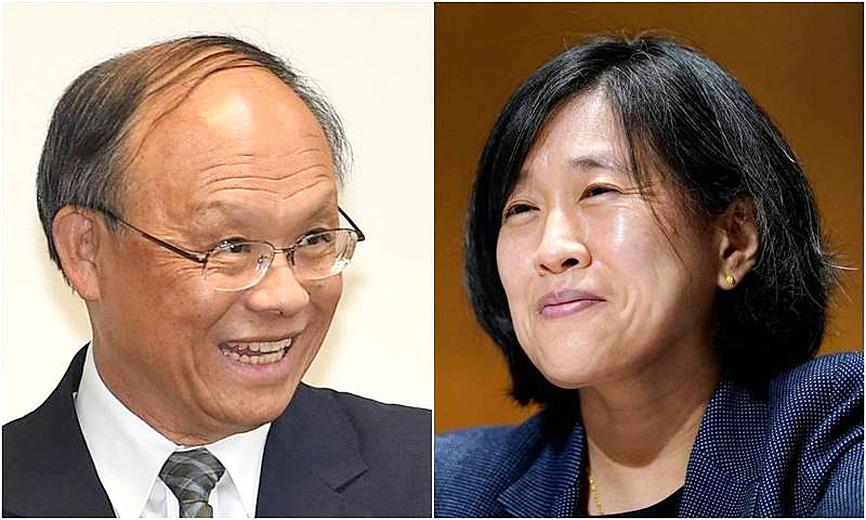Minister Without Portfolio John Deng (鄧振中) on Monday held a virtual meeting with US Trade Representative (USTR) Katherine Tai (戴琪) to discuss bilateral trade issues.
During the videoconference, Deng, who serves as the Taiwan’s top trade negotiator, expressed the hope that Taiwan and the US would begin talks on a bilateral trade agreement, an official in the Cabinet’s Office of Trade Negotiations told the Central News Agency yesterday on condition of anonymity.
The official declined to comment on whether the bilateral discussions touched on the Indo-Pacific Economic Framework (IPEF), an initiative proposed last year by the US government with the aim of enhancing its economic engagement in the Indo-Pacific region.

Photo: Taipei Times / AFP
Nor was it mentioned in a readout provided by the USTR.
In Monday’s meeting, the two sides reviewed progress made on bilateral trade issues since a Trade and Investment Framework Agreement (TIFA) council meeting in June last year, and agreed to remain in contact on those and other issues in the coming months, the readout said.
“They also discussed their mutual interest in working together on issues of common concern, including regionally and in multilateral organizations like the World Trade Organization,” the readout added.
The IPEF has yet to be clearly defined, but according to a US Congressional Research Service report, US officials do not envision it taking the form of a traditional trade agreement.
Instead, it is to include different modules covering “fair and resilient trade, supply chain resilience, infrastructure and decarbonization, and tax and anticorruption,” the report said.
Taipei has expressed an interest in participating in the IPEF initiative.
However, at a US Senate hearing at the end of last month, Tai was unwilling to comment on whether Taiwan would be invited to join the planned IPEF, saying only that the matter had yet to be decided.
Deng and Tai held their first bilateral meeting in June last year, shortly before the TIFA council meeting, which included high-level trade and investment talks between the two countries.
During the TIFA council meeting, the two sides discussed bilateral trade issues such as supply chains, intellectual property and agriculture, while exploring opportunities to work together on tackling the climate change crisis, the USTR added.

MORE VISITORS: The Tourism Administration said that it is seeing positive prospects in its efforts to expand the tourism market in North America and Europe Taiwan has been ranked as the cheapest place in the world to travel to this year, based on a list recommended by NerdWallet. The San Francisco-based personal finance company said that Taiwan topped the list of 16 nations it chose for budget travelers because US tourists do not need visas and travelers can easily have a good meal for less than US$10. A bus ride in Taipei costs just under US$0.50, while subway rides start at US$0.60, the firm said, adding that public transportation in Taiwan is easy to navigate. The firm also called Taiwan a “food lover’s paradise,” citing inexpensive breakfast stalls

TRADE: A mandatory declaration of origin for manufactured goods bound for the US is to take effect on May 7 to block China from exploiting Taiwan’s trade channels All products manufactured in Taiwan and exported to the US must include a signed declaration of origin starting on May 7, the Bureau of Foreign Trade announced yesterday. US President Donald Trump on April 2 imposed a 32 percent tariff on imports from Taiwan, but one week later announced a 90-day pause on its implementation. However, a universal 10 percent tariff was immediately applied to most imports from around the world. On April 12, the Trump administration further exempted computers, smartphones and semiconductors from the new tariffs. In response, President William Lai’s (賴清德) administration has introduced a series of countermeasures to support affected

CROSS-STRAIT: The vast majority of Taiwanese support maintaining the ‘status quo,’ while concern is rising about Beijing’s influence operations More than eight out of 10 Taiwanese reject Beijing’s “one country, two systems” framework for cross-strait relations, according to a survey released by the Mainland Affairs Council (MAC) on Thursday. The MAC’s latest quarterly survey found that 84.4 percent of respondents opposed Beijing’s “one country, two systems” formula for handling cross-strait relations — a figure consistent with past polling. Over the past three years, opposition to the framework has remained high, ranging from a low of 83.6 percent in April 2023 to a peak of 89.6 percent in April last year. In the most recent poll, 82.5 percent also rejected China’s

PLUGGING HOLES: The amendments would bring the legislation in line with systems found in other countries such as Japan and the US, Legislator Chen Kuan-ting said Democratic Progressive Party (DPP) Legislator Chen Kuan-ting (陳冠廷) has proposed amending national security legislation amid a spate of espionage cases. Potential gaps in security vetting procedures for personnel with access to sensitive information prompted him to propose the amendments, which would introduce changes to Article 14 of the Classified National Security Information Protection Act (國家機密保護法), Chen said yesterday. The proposal, which aims to enhance interagency vetting procedures and reduce the risk of classified information leaks, would establish a comprehensive security clearance system in Taiwan, he said. The amendment would require character and loyalty checks for civil servants and intelligence personnel prior to